By Dave Workman | Senior Editor
With the future of the Second Amendment virtually always hanging in the balance, and a looming 2020 election that could be make-or-break for gun-friendly Donald Trump and Capitol Hill Republicans, rights activists gathering at the Gun Rights Policy Conference in Phoenix got some advice on how to advance the pro-rights message.
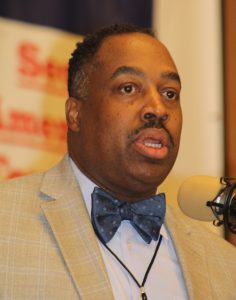
Kenn Blanchard
Kenn Blanchard, known internationally as the “Black Man with a Gun,” told the audience that he uses “hot buttons” to grab peoples’ attention and hold it. One of those strategic “hot buttons” is to be the “nurturer.” You have a firearm to protect your family, especially your children. He says this is a good way to stop an anti-gunner in mid-sentence when you bring up family.
Another approach is to discuss it as a personal choice, so that “anybody can relate to it,” Blanchard suggested.
Discovery is another strategy. Ask someone if they might like to shoot your AR15, or any firearm you own. Many people discover that guns and shooting aren’t so bad after all.
These and other strategies have been winning people over for a long time, and Blanchard said using these approaches is how to “advance your message.”

Derek LeBlanc
Joining Blanchard on stage was Derek LeBlanc with the Kids SAFE Foundation, an Oregon-based effort. He encouraged activists to get involved because, “We can no longer be silent and let them take away our constitutionally-protected rights.”
The challenge for all Second Amendment advocates is to learn how the political system works and find ways to add their voices, he explained. His advice was to “go on the offensive; bring experience to the conversation.”
Successful activists develop a network of contacts in the legislature and work with those people to reverse the incremental erosion of gun rights.
LeBlanc also encouraged activists to let women gun owners do the talking. This advances the notion that shooters are not all stereotypes.
“We will get so much further if we let the women speak for us,” he observed.
LeBlanc also encouraged gun owners to work with lawmakers to craft legislation that counters anti-gun bills.
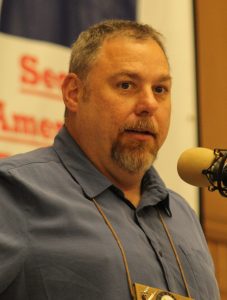
Mike Piwowarski
Mike Piwowarski, host of the nationally-syndicated Arms Room Radio broadcast, advised activists to create a “resume” that would show any reader they have expertise in firearms. Attendance at the conference, participation in training courses and other activities including joining organizations in other states enhances one’s qualifications to speak on the issue with some degree of authority.
He also suggested writing letters to the editor, submitting Op-Ed columns to local newspapers and, if those letters and articles are published, they simply add to one’s resume.
Piwowarski further tipped activists to “hire a reporter.” That translates to becoming a “go to” person when gun questions come up.
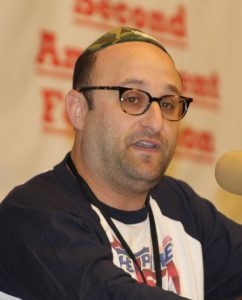
Yehuda Remer
Author Yehuda Remer, whose “Safety On” books open the door to educating youngsters about firearms safety, reminded the audience that the Second Amendment is under attack “from both sides of the aisle.” He said the “first shots in America’s second Civil War” have already been fired and they were aimed at the First Amendment. This happens when posts on social media are removed, essentially silencing their voices.
“Advancing the gun rights message,” he stated, “must begin with our kids. They are our future.”
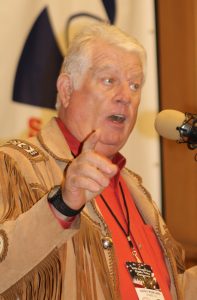
Johnny Rowland
Wrapping up this panel was Johnny Rowland, representing the Hispanic American Rifle Association. His message to the conference crowd was simple: “Anti-gunners don’t appreciate that we are armed…armed citizens are in the way of a global police state.”
Rowland encouraged people to reach out to Hispanic shooters, since the firearms community is “looking for allies.”
“Nobody,” he stated, in a reference to Venezuela, “is more aware of what an unarmed country goes through than the Hispanic people. You have brutality on the population when you have gun control.”
Using Pro-Gun Books
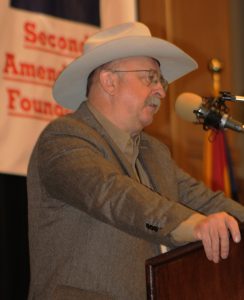
Dave Workman
The next panel featured Dave Workman, senior editor at TGM, and author Dan Wos. Both spoke about using pro-gun-rights books to “influence the debate.”
Workman has co-authored several books with SAF founder and Executive Vice President Alan Gottlieb, the most recent of which is titled “Good Guys With Guns.” Copies were provided at the conference.
He told the audience that such books might make good gifts to people so they can understand the “other side” of the gun rights issue. He also reminded the audience that having a firearm is a right protected by the Constitution, not a government-regulated privilege.
Pro-gun-rights books also offer information useful to grassroots activists in order to provide contrast to anti-gun-rights arguments.
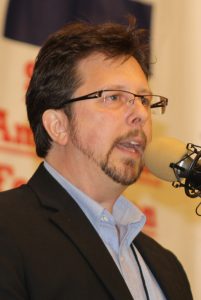
Dan Wos
Wos, author of “Good Gun, Bad Guy” and “Good Gun, Bad Guy II” continued the discussion about rights versus privileges. He advised activists to quickly counter arguments that people don’t “need” certain firearms by reminding them, “It’s not a Bill of Needs.”
“They know the Second Amendment is a right,” he observed. “They just don’t want it to be.”
He detailed some of the catch phrases used by anti-gunners to advance their arguments, including “the big daddy of them all,” the term “gun violence.” He said the term is a “straw man argument”
“It doesn’t exist,” Wos said. “There is human violence.”
He also asserted that policies put into law by anti-gunners “often cause many of the problems we have.”
Wos also counseled activists to challenge anti-gunners when they attempt to distort the gun rights position by demanding, “Why are you distorting my position?”
He suggested using school shootings as an example of a failed policy because schools are so-called “gun free zones” yet they have not prevented tragedies.
“Ask (anti-gunners) if they feel any responsibility for gun free school zones,” Wos advised.
He closed by reminding the audience, “We are millions strong. We stand together to support our rights.”



